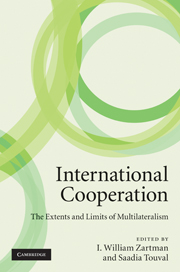Book contents
- Frontmatter
- Contents
- List of figures
- List of tables
- List of contributors
- Acknowledgements
- 1 Introduction: return to the theories of cooperation
- Part 1 Multilateral meanings of cooperation
- Part 2 Multiple strategies of cooperation
- 6 Synthesizing rationalist and constructivist perspectives on negotiated cooperation
- 7 The shadow of the past over conflict and cooperation
- 8 Chicken dilemmas: crossing the road to cooperation
- 9 Conflict management as cooperation
- 10 Status concerns and multilateral cooperation
- 11 Asymmetrical cooperation in economic assistance
- 12 Conclusion: improving knowledge of cooperation
- Bibliography
- Index
11 - Asymmetrical cooperation in economic assistance
Published online by Cambridge University Press: 05 June 2012
- Frontmatter
- Contents
- List of figures
- List of tables
- List of contributors
- Acknowledgements
- 1 Introduction: return to the theories of cooperation
- Part 1 Multilateral meanings of cooperation
- Part 2 Multiple strategies of cooperation
- 6 Synthesizing rationalist and constructivist perspectives on negotiated cooperation
- 7 The shadow of the past over conflict and cooperation
- 8 Chicken dilemmas: crossing the road to cooperation
- 9 Conflict management as cooperation
- 10 Status concerns and multilateral cooperation
- 11 Asymmetrical cooperation in economic assistance
- 12 Conclusion: improving knowledge of cooperation
- Bibliography
- Index
Summary
This chapter is about asymmetrical cooperation, as seen in typical foreign aid or official development assistance (ODA), and about the way in which interests rather than reciprocity foster cooperation. It contrasts the effects of proximate (specific) interests and distant (altruistic or general) interests in the choice of bilateral versus multilateral aid recipients, each providing a different basis of cooperation that fits the particular characteristics of the chosen aid recipients. Thus it takes apart the argument that asymmetrical cooperation only serves the stronger party, showing instead that a balance of diverse interests (Udalov 1995) underlies different types of asymmetrical cooperation, much as different values have been shown to constitute the basis of a successful negotiated agreement (Homans 1961; Nash 1950). Thus durable cooperation can come from repeated, matched asymmetrical exchanges, that in turn form the basis of justifying norms that stabilize the instances of cooperation.
The starting point of this chapter, which may appear to be far from these conclusions, is found in the debate opened by the World Bank (Burnside and Dollar 2000, p. 854) on aid efficiency. Its finding was the absence of any “significant tendency for total aid or bilateral aid to favor good policy. On the other hand, aid that is managed multilaterally (about one-third of the total) is allocated in favor of good policy.” Burnside and Dollar interpreted bilateral aid allocation decisions as the consequence of a bias toward the self-interest of donors – in particular their geopolitical interests – while multilateral institutions would be more motivated by the needs and merits of potential recipients, and therefore would allocate their development assistance more efficiently.
- Type
- Chapter
- Information
- International CooperationThe Extents and Limits of Multilateralism, pp. 208 - 226Publisher: Cambridge University PressPrint publication year: 2010



